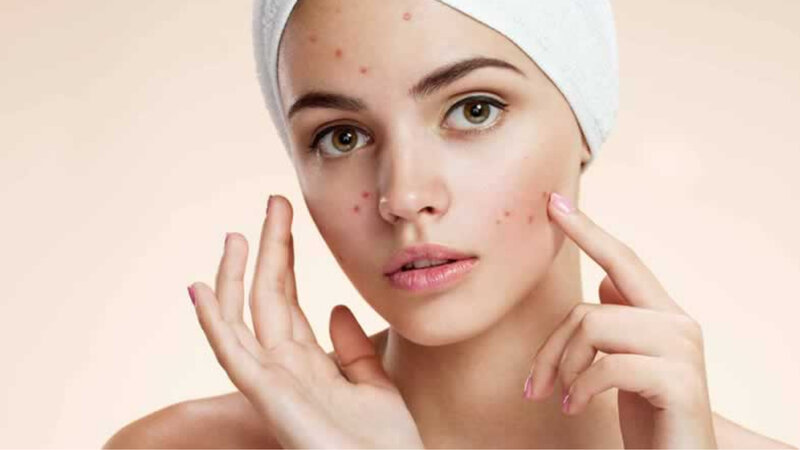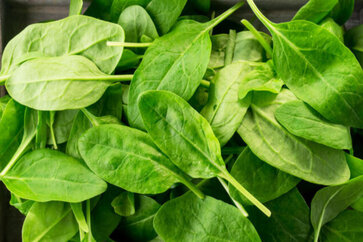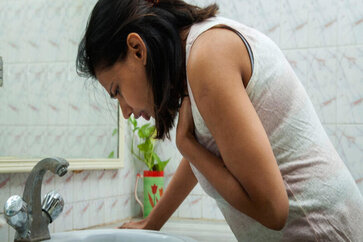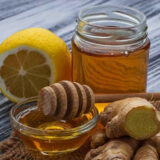Ayurvedic Medicine For Acne Scars
Acne, also known as acne vulgaris or common acne, is a prevalent skin condition that encompasses various issues. Contrary to being classified as a disease, acne presents several challenges. It affects not only teenagers but also individuals between the ages of 10 and 40.
Even adults in their mid to late 20s, who may not have experienced acne breakouts for years or at all, can develop this condition. However, it is worth noting that some people who have acne in their 40s may eventually outgrow it.
Types of skin Acne
Acne encompasses several types of skin conditions, including:
1. Rosacea
This condition primarily manifests as pimples in the central region of the face, accompanied by redness, flushing, and visible superficial blood vessels. Typically, it affects individuals aged 30 and above, but there may not always be a distinct boundary between acne and rosacea. Rosacea does not involve blackheads or whiteheads.
2. Pseudofolliculitis
Commonly referred to as “razor bumps” or “razor rash,” this condition occurs when closely cut hair curls back and grows into the skin, causing inflammation. Pseudofolliculitis is a mechanical issue rather than a bacterial one, and it can be managed by reducing shaving frequency (e.g., growing a beard) or considering treatments like laser hair removal. It is possible for individuals with acne to experience pseudofolliculitis as well.
3. Folliculitis
Pimples may arise in areas other than the face, such as the abdomen, buttocks, or legs. These are follicular in nature but lack inflammation. If they do not resolve on their own, doctors may prescribe oral or topical antibiotics, although they might differ from the ones commonly used for acne.
3. Gram-negative folliculitis
Some patients who have been on prolonged courses of oral antibiotics develop pustules filled with bacteria that are resistant to previously used antibiotics. These bacteria can be identified through bacterial culture tests, prompting the doctor to prescribe alternative antibiotics or other forms of treatment.
Ayurvedic medicine for acne scars
The Ayurvedic approach to treating acne scars focuses on a holistic and natural approach to promote skin healing and rejuvenation. Here are some Ayurvedic recommendations:
1. Cleanse and Detoxify: Start by cleansing the body internally. Drink warm water with lemon in the morning to detoxify and promote digestion. Herbal teas like neem, turmeric, and chamomile can also support detoxification.
2. Ayurvedic Diet: Follow a balanced and nourishing diet based on your dosha (body type). Emphasize fresh fruits, vegetables, whole grains, and legumes. Avoid oily, fried, and processed foods, as they can aggravate acne. Include spices like turmeric, cumin, and coriander, known for their detoxifying and anti-inflammatory properties.
3. Herbal Supplements: Ayurvedic herbs like neem, turmeric, and Triphala have potent anti-inflammatory and antibacterial properties. Consult an Ayurvedic practitioner to determine the appropriate herbs or formulations for your specific needs.
External Application
Use natural remedies for topical application. Some options include:
1. Neem paste or oil: Apply neem paste or oil to the affected areas to reduce inflammation and fight bacteria.
Turmeric paste: Mix turmeric powder with water or honey to make a paste and apply it to the scars. Turmeric has anti-inflammatory and skin-brightening properties.
Aloe vera gel: Apply fresh aloe vera gel to the scars to promote healing and reduce inflammation.
2. Facial Steaming: Steaming the face can open up the pores and help cleanse the skin. Boil water, place your face over the steam (at a safe distance), and cover your head with a towel to trap the steam. Be cautious not to burn yourself.
3. Face Masks: Use natural face masks to nourish and rejuvenate the skin. Some beneficial ingredients include sandalwood, turmeric, honey, and rose water. These masks can help reduce scarring and promote a healthy complexion.
4. Stress Management: Stress can exacerbate acne. Practice stress management techniques like yoga, meditation, and deep breathing exercises to promote relaxation and balance.
5. Adequate Sleep: Getting enough sleep is essential for overall skin health and healing. Aim for 7-8 hours of quality sleep each night.
6. Hydration: Drink plenty of water throughout the day to keep your skin hydrated and support detoxification.
7. Gentle Skincare Routine: Use gentle and natural skincare products suitable for your skin type. Avoid harsh chemicals that can irritate the skin and worsen acne scars.
Ayurvedic Approach to Treating Acne Scars
Overall, acne encompasses various conditions that affect the skin, each with its own distinct characteristics and management approaches.
1. Maintaining a healthy and nutritious diet plays a crucial role in overall well-being. Unhealthy eating habits can contribute to the development of diseases. Therefore, it is important to focus on consuming nourishing and wholesome foods.
2. Restoring a balanced diet and engaging in regular exercise are essential for regulating bowel movements.
3. Mild laxatives can be used to prevent constipation.
4. It is advisable to avoid the practice of refrigerating and reheating food as it diminishes its nutritional value. Whenever possible, opt for fresh and freshly prepared meals.
5. Consume warm and Snigdha (unctuous) foods in appropriate quantities.
6. Wait until the previous meal is digested before eating again.
7. Avoid consuming Virudhaanna (foods that are incompatible with each other, such as fruit salad with milk). Additionally, refrain from eating too quickly or too slowly, and make sure to chew your food thoroughly.
8. Create a pleasant environment while eating.
9. Steer clear of Ushna (hot), spicy, oily, fried, and pungent foods.
10. Minimize the consumption of junk food, fast food, and outside food, as they often contain excessive spices, oil, and chemicals like sodium bicarbonate.
11. Consume an adequate amount of healthy fats and leafy vegetables after washing and cleaning them properly. These will add bulk to your stool, promoting regular bowel movements and relieving constipation.
12. Stay well-hydrated by drinking enough water and fluids. This helps reduce intestinal dryness and aids in eliminating waste through urine. Fruit juices like grapes and lemon are recommended.
13. Avoid mental tensions, worries, and fears. Practicing meditation and yoga can aid in mental relaxation and stress release.
14. Maintain a relaxed state of mind, as stress can exacerbate the problem.
15. Exposure to fresh water, fresh air, and sunlight can help improve the condition of the skin.
16. Engaging in regular exercise and taking long walks will help keep you fresh, fit, and healthy.
17. Maintaining overall hygiene, especially of the face, is crucial to remove dirt and grime. Wash your face frequently with warm water.
18. Use mild soap to cleanse the face and remove surface oil. You may consider using a slightly abrasive face sponge for gentle exfoliation. In severe cases with persistent pain and inflammation, steaming can be beneficial.
19. Avoid using oily cosmetics and opt for non-greasy, water-based alternatives. Ideally, it is best to avoid using cosmetics altogether.
20. Refrain from unnecessarily pressing or pricking acne, as this can lead to more significant problems by allowing dirt to enter vulnerable areas.
Note:
Remember, it’s important to consult an Ayurvedic practitioner or healthcare professional before starting any new treatments or supplements, especially if you have underlying health conditions or are taking medications. They can provide personalized guidance and recommendations based on your unique needs.























